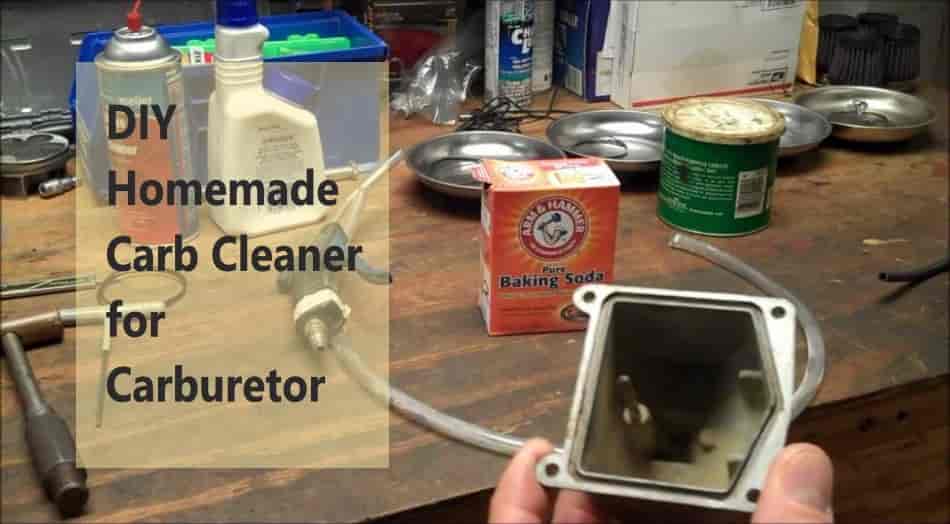While there are numerous commercial carburetor cleaners available on the market, some people prefer to take a do-it-yourself approach and create their own homemade carb cleaner. But how easy is it to make and use a homemade carb cleaner? In this guide, we will explore the process of creating a DIY carb cleaner and discuss its effectiveness in tackling carburetor buildup. Whether you’re a seasoned DIY enthusiast or simply looking to save a few bucks, read on to discover if making your own carb cleaner is a viable option for you.
Can You Make Your Own Carb Cleaner for Carburetor?
Yes, it is possible to make your own carb cleaner using readily available household ingredients. Homemade carb cleaners are typically composed of a mixture of solvents and cleaning agents that help break down deposits and remove dirt and grime from carburetors. While commercial carb cleaners are formulated with specific chemicals designed for this purpose, a homemade carb cleaner can be a cost-effective alternative.

To make your own carb cleaner, you can consider the following ingredients:
- White vinegar: Vinegar is a mild acid that can help dissolve deposits and clean carburetors effectively.
- Baking soda: Baking soda is an abrasive agent that aids in scrubbing away stubborn residue.
- Water: Water is used to dilute the cleaning solution and make it less concentrated.
- Spray bottle: A spray bottle will be useful for applying the homemade carb cleaner to the carburetor.
Here’s a simple recipe to create your own carb cleaner:
- In a bowl, mix equal parts white vinegar and water. For example, you can start with 1 cup of each.
- Add a tablespoon of baking soda to the mixture and stir well until it dissolves.
- Transfer the solution into a spray bottle for easy application.
Once you have your homemade carb cleaner ready, you can follow these steps to clean your carburetor:
- Remove the air cleaner and any other parts that obstruct access to the carburetor.
- Spray the homemade carb cleaner generously onto the carburetor, targeting the affected areas and any visible deposits.
- Allow the cleaner to penetrate for a few minutes.
- Use a small brush or toothbrush to gently scrub the carburetor, paying close attention to the crevices and hard-to-reach areas.
- Rinse the carburetor with clean water and wipe away any remaining cleaner or residue.
- Reassemble the carburetor and other removed components.
It is important to note that homemade carb cleaners may not be as potent as commercial ones and may not effectively remove heavy buildup. In such cases, it may be necessary to consult a professional or use a commercial carb cleaner for more stubborn deposits.
Remember to always follow safety precautions and consult your vehicle’s manual or seek professional advice if you are unsure about the cleaning process or have concerns about your specific carburetor model.
What Ingredients To Use to Make Your Own Carb Cleaner?
To make your own carb cleaner, you can use a combination of the following ingredients:
- Isopropyl Alcohol: Isopropyl alcohol, also known as rubbing alcohol, is a common ingredient in homemade carb cleaners. It acts as a solvent and helps dissolve varnish and other deposits.
- Acetone: Acetone is another solvent that is effective in removing tough carburetor deposits. However, it is important to use it sparingly and in a well-ventilated area, as it is highly flammable.
- Baking Soda: Baking soda is an abrasive agent that aids in scrubbing away stubborn residue from the carburetor.
- Water: Water is used to dilute the cleaning solution and make it less concentrated.
- Dish Soap: Adding a small amount of dish soap to the mixture can help break down grease and oil deposits.
- White Vinegar: White vinegar is a mild acid that can assist in dissolving deposits and cleaning the carburetor effectively.
- Lemon Juice: Lemon juice contains citric acid, which can be helpful in removing carburetor buildup.
When using these ingredients, it’s important to mix them in appropriate proportions to ensure effectiveness and avoid damaging the carburetor. Experimentation may be necessary to find the right ratio that works best for your specific cleaning needs.
Always exercise caution and follow safety guidelines when working with chemicals. Ensure proper ventilation, wear protective gloves and eyewear, and avoid open flames or sparks. Remember that while homemade carb cleaners can be effective in many cases, there may be instances where professional assistance or commercial carb cleaners are required for more severe carburetor buildup.
How To Make DIY Homemade Carb Cleaner
To make your own DIY homemade carb cleaner, you can follow these steps:
Gather the necessary ingredients and materials. You will need: In a bowl or container, mix the ingredients. Here’s a simple recipe to get you started:
- Transfer the homemade carb cleaner into a spray bottle for easy application. Make sure to label the bottle for future reference.
- Before applying the carb cleaner, ensure that the carburetor is cool and the engine is turned off.
- Remove the air cleaner and any other components that obstruct access to the carburetor.
- Spray the homemade carb cleaner generously onto the carburetor, focusing on areas with visible dirt, debris, or buildup. Be careful not to overspray or allow the cleaner to come into contact with sensitive electrical components.
- Allow the cleaner to sit on the carburetor for a few minutes, giving it time to penetrate and break down the deposits.
- Use a small brush or toothbrush to gently scrub the carburetor, paying attention to hard-to-reach areas and crevices. This will help dislodge stubborn grime and facilitate the cleaning process.
- Rinse the carburetor with clean water to remove any remaining cleaner and debris. You can use a spray bottle or a gentle stream of water for this step. Ensure that all the cleaner and residue are thoroughly washed away.
- Once the carburetor is clean and free of residue, allow it to dry completely before reassembling the removed components.
It’s important to note that the effectiveness of the homemade carb cleaner may vary depending on the extent of the carburetor buildup. In some cases, multiple cleaning cycles or the use of commercial carb cleaners may be necessary for stubborn deposits.
Remember to take necessary safety precautions, such as wearing gloves and eye protection, working in a well-ventilated area, and following the instructions provided by your vehicle’s manufacturer. If you have any doubts or concerns, it’s advisable to consult a professional mechanic or refer to your vehicle’s manual.
Where To Buy The Ingredients?
The ingredients required for making a homemade carb cleaner can be found at various places. Here are some common places where you can buy the ingredients:
- Local Supermarkets and Grocery Stores: Isopropyl alcohol, baking soda, water, dish soap, and spray bottles can typically be found in the cleaning or household supplies section of your local supermarket or grocery store.
- Drugstores and Pharmacies: Isopropyl alcohol, also known as rubbing alcohol, is often available at drugstores or pharmacies. They usually carry different concentrations, so be sure to choose the appropriate strength for your needs.
- Hardware Stores: Some larger hardware stores may carry isopropyl alcohol and spray bottles in their cleaning or automotive sections. Additionally, you can find small brushes or toothbrushes for cleaning at hardware stores.
- Online Retailers: Popular online retailers like Amazon, eBay, or specialty automotive supply websites offer a wide range of cleaning products, including isopropyl alcohol, spray bottles, and cleaning brushes. You can conveniently order these ingredients online and have them delivered to your doorstep.
- Automotive Parts Stores: Stores specializing in automotive parts and supplies often carry commercial carb cleaners. While you may not find the exact ingredients for making a homemade carb cleaner, these stores can be a good option if you prefer using a commercial product.
Final Verdict
In conclusion, making your own DIY homemade carb cleaner is a feasible option for cleaning your carburetor. By using readily available ingredients such as isopropyl alcohol, baking soda, water, and dish soap, you can create a cleaning solution to tackle carburetor buildup.
However, it’s important to note that the effectiveness of homemade carb cleaners may vary depending on the extent of the deposits and the specific cleaning needs of your carburetor. While homemade carb cleaners can be effective for regular maintenance and light buildup, more stubborn or heavy deposits may require the use of commercial carb cleaners or professional assistance.

